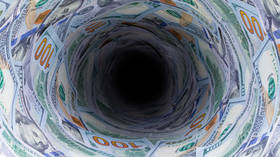Saudi Arabia books $29-BILLION deficit in Q2
Saudi Arabia booked a deficit of $29 billion for the second quarter of the year because of the continued slump in oil prices and oil demand, which affected revenues.
Reuters reports the Kingdom’s oil revenues for April to June were down 45 percent on the year, with total budget revenues down 49 percent from a year earlier.
Saudi Arabia has taken some austerity steps already in an attempt to rein in public spending and mitigate the impact of the oil crisis on its economy, but it seems more would be needed.
“A pullback in spending is essential for containing the deficit,” Reuters quoted Monica Malik, chief economist at Abu Dhabi Commercial Bank, as saying. “The proactive stance of the government was already reflected in the austerity measures announced in April. However, these will dampen the recovery outlook.”
READ MORE: Saudi reserves plunge as kingdom struggles with Covid-19 pandemic & oil-market rout
So far this year the Saudi government has announced a cut in 2020 budget expenditures of $13.2 billion through “a partial reduction in some items with the least social and economic impact,” along with a tripling of value-added tax to 15 percent from five percent and a suspension of the so-called cost-of-living allowances for all Saudi public servants, who are the majority of Saudis in employment.
Also on rt.com Oil price crash sparks a wave of banking mergers in the Middle EastThe problem with these austerity measures is that they may slow down the economy’s recovery once the crisis is over. And the fact that the Kingdom also plans to borrow a lot to get through the worst of it is not helping, either, because loans need to be repaid. For now, there is a strong interest in Saudi debt, but if we are indeed past peak oil demand, this may change before long. So far this year, Riyadh has borrowed almost $13 billion on the international and domestic markets.
The IMF expects Saudi Arabia’s economy to contract by 6.8 percent this year. The Kingdom itself has called the figure pessimistic.
This article was originally published on Oilprice.com














